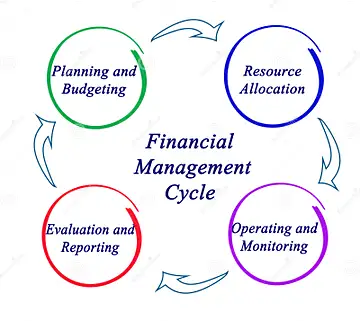
I’m here to help you with understanding the fundamentals of online business finance management.
Running an online business comes with its own set of challenges and financial management is one of them.
We’re going to explore why keeping a close eye on your finances isn’t just about survival, but it’s also about setting yourself up for sustained growth and success.
You’re going to find out about various tools and strategies that can help make financial tracking not only easier but more efficient.
Managing your money well can make or break your online venture, so this is crucial. We’ll discuss how you can take control of your finances right from the start.
This isn’t just about balancing the books. It’s also about building a solid financial foundation, which leads into the next section.
I’m going to walk you through how to set up a strategic financial foundation that will serve as the bedrock of your online business.
This includes creating a business plan that makes financial sense, choosing a business structure that aids financial management, and understanding the importance of budgeting and cash flow.
Setting Up a Strategic Financial Foundation
I’m going to let you in on what builds the bedrock of any successful online business: a solid financial foundation.
This isn’t just about having a business idea; it’s also about making sure that idea can stand firm against financial storms.
First up, let’s tackle creating a bulletproof business plan and forecast. If you want to guide your business toward success, knowing where you’re financially headed is key.
A well-crafted plan outlines your business objectives, strategies, measures of success, and, crucially, your financial projections.
Choosing the right business structure is more than just paperwork; it influences everything from daily operations to taxes, and yes, how you manage your finances.
Whether you’re a sole proprietor or running an LLC, each structure has implications for your financial strategy.
Don’t worry too much about getting bogged down in the budgeting details. The key is to keep an eye on your cash flow.
You want to be where the money’s flowing in, not just out. Budgeting isn’t just about cutting costs; it’s a roadmap for investment – in resources, marketing, and product development.

Navigating Online Payment Systems and Merchant Services
When you run an online business, you’re going to have to grapple with a vast array of online payment systems and merchant services.
This isn’t just about choosing the most popular platform; it’s also about finding the one that fits your business model and your customers’ preferences like a glove.
I’m here to help you with a deep dive into the various online payment gateways.
You’ll need to weigh factors like transaction fees, payment options, international transactions, and the user experience provided to your customers.
If you want to cater to a broad market, you can’t ignore the likes of PayPal, Stripe, and Square – they’re some of the industry’s big hitters.
But don’t worry too much about getting locked into one service; many businesses use multiple gateways to cover all their bases.
You can always adjust your approach down the road, but it’s prudent to choose something that resonates with your customer demographic from the start.
Are they tech-savvy shoppers who prefer digital wallets? Are they international buyers needing currency conversion? These questions will guide your selection.
The integration of online payments into your accounting software is a powerhouse move. Talk about streamlining operations!

This means real-time financial data at your fingertips, less manual input, and fewer errors. In essence, a well-integrated system does some heavy lifting for you, so you can focus on growing your business.
Now, remember to keep your eyes peeled for security features. With online transactions, trust is everything.
Customers need to feel confident their data is protected, and that comes down to secure, encrypted payment processes.
Up next, I’ve got something insightful for you. We’re going to explore financial management tools with a top finance company.
This isn’t just about tracking your sales and expenses – it’s about understanding the financial health of your business and making smart decisions to optimize your growth.
Exploring Financial Management Tools with a Top Finance Company

In the tapestry of online business operations, having robust financial management tools is non-negotiable.
The right tools not only streamline accounting tasks but also provide critical financial insights that drive strategic decisions.
When it comes to top finance companies that cater to digital ventures, one name often comes to the forefront: Intuit QuickBooks.
Intuit QuickBooks stands out for its comprehensive suite of services tailored to small and medium-sized online businesses.
It encompasses everything from invoicing and payment processing to payroll and expense tracking, all within a user-friendly interface.
Let’s delve into how QuickBooks can reform the way you manage your online business finances.
A key feature of QuickBooks is its ability to facilitate swift invoicing and ease the process of getting paid.
It integrates with various online payment systems, ensuring that whether a customer pays by credit card or PayPal, your books reflect the transaction accurately and instantly.
Moreover, QuickBooks’ ability to synchronize with your bank and credit card accounts allows for automatic transaction updates, which weeds out the pains of manual data entry.
Expense tracking is another cornerstone of QuickBooks’ functionality.
By categorizing business expenses and linking them to specific customers or projects, it offers granular insights into where your money is going.
This level of detail is invaluable when evaluating the profitability of different segments of your business.
Comprehensive reporting is where QuickBooks shines.
It arms you with the power to generate a variety of reports, such as profit and loss statements, balance sheets, and cash flow summaries, which are pivotal for assessing financial performance.
With QuickBooks as your financial management partner, you’re equipped to make informed decisions that align with your business goals.
Transitioning to advanced financial strategies will require you to harness data analytics, which QuickBooks is adept at facilitating.
Its reporting capabilities prepare you for a deeper dive into financial decision-making, setting you up for success as you move on to the next section of our discussion: advanced financial strategies for online businesses.
Conclusion: Keeping Your Online Business Financially Healthy
Managing your online business finances is an ongoing process that requires diligence, adaptation, and the right set of tools.
Remember that your business’s financial health isn’t just about the numbers; it’s about making informed decisions that will steer your business toward long-term success.
By leveraging tools like Intuit QuickBooks and staying on top of your financial data, you can make those crucial decisions with confidence.
Reviewing your financial performance regularly isn’t just a good habit; it’s a critical part of ensuring your business remains competitive and resilient in a rapidly changing digital landscape.
Finally, don’t hesitate to seek expert advice when you need it, and always keep learning to stay ahead of financial management trends and best practices.
I hope that you find these strategies helpful in managing your online business finances efficiently.
Any questions you may have on this article feel free to leave those messages in the comment box below.
